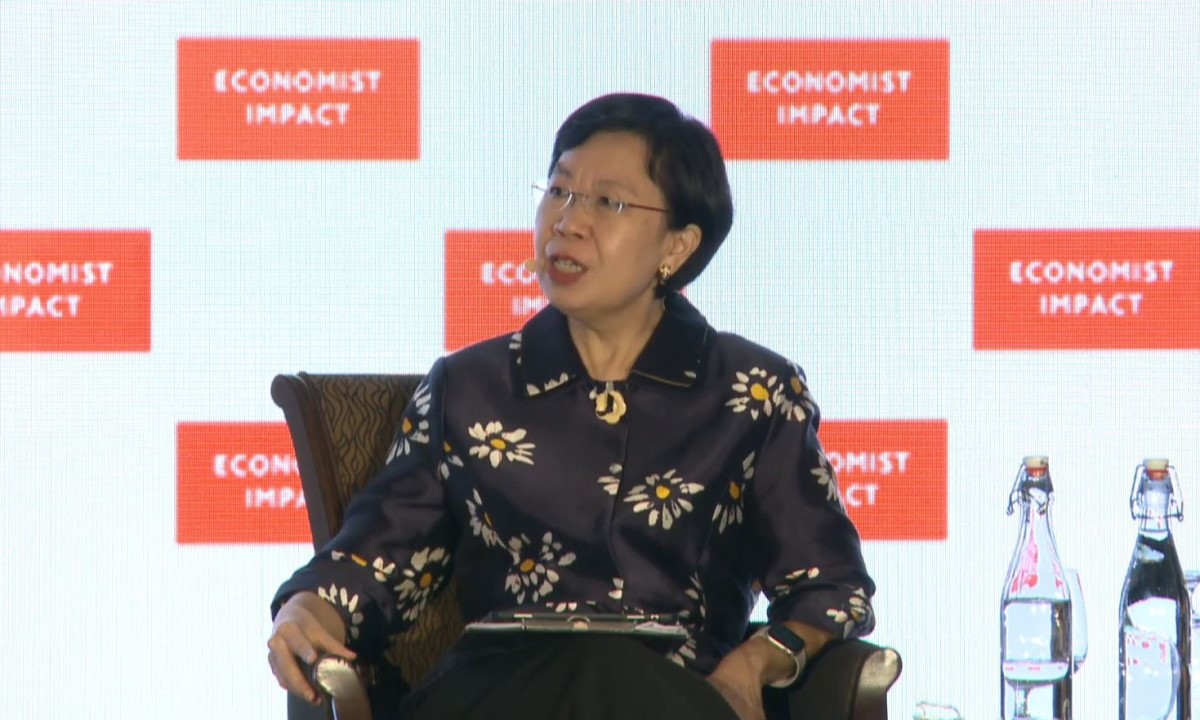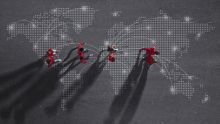
There is no silver bullet for propelling global development, resilience and advancement. Still, a circular economy plays a critical role in addressing climate change and biodiversity loss — all while tackling social needs as we journey together towards a green recovery.
The Economist's Sustainability Week Asia brought together businesses, financiers, investors, policymakers, entrepreneurs and researchers from around the region to seek actionable insights and solutions that help businesses and policymakers take a more holistic approach to sustainability.
SMU President Professor Lily Kong joined the panel discussion on Circular Pathways for Growth and Recovery on 16 February 2022 to examine the main roadblocks to creating a circular economy. The panel — which included Carola Richter, President, Asia-Pacific, BASF; Isabella Huang-Loh, Chairman, Singapore Environment Council; Satoshi Konagai, Leader, LIXIL Water Technology; and was moderated by Andrew Staples, Regional Head (APAC), policy and insights, Economist Impact — also deliberated steps to avoid such obstacles, delved into ways in which stakeholders might contribute to the circular economy's success, and how circular economy principles can aid economic recovery.
Making the case for a circular economy
In contrast to a linear economy, whereby we "take, make and waste", a circular economy aims to reduce waste by recovering resources at the end of a product's lifespan or using existing materials and channelling them back into production. Unlike recycling, explained Prof Kong, which can only be executed at the end of the product lifecycle, a circular economy begins right at the start of a product's life.
"It lies at the very beginning of product design," said Prof Kong.
"At the very beginning of product production and its dissemination, you've already embedded processes which allow you to reuse some of the natural resources and raw materials — it’s very intentional."
Besides the manufacturing sector, Prof Kong observed that the circularity concept also applies to business model innovation. A trend accelerated by the pandemic, the circular business model considers how an organisation creates, offers and delivers value to its stakeholders while reducing environmental and social costs. It involves business leaders rethinking services, logistics and "every part of the equation right down to financing" to determine their footprint and impact in becoming more circular.
Paving the way to sustainable recovery
Furthermore, besides promoting environmental and social sustainability, a circular economy could also play a significant role in recovery from the pandemic's economic effects and generating more sustainable growth. Ms Huang-Loh suggests that consumers and producers need to consider the regeneration of natural resources instead of solely focusing on recycling. For example, plastic waste can be converted into fuel through a regenerative process of pyrolysis. However, as "consumers are not sold on how they get a cut into the whole equation yet", the widespread adoption of such practices requires greater social and industry impact to take place.
As such, all panellists agreed that we could not rely on any single government or business to lead the charge but embark upon a multi-stakeholder, multi-agency effort to realise a circular economy. For example, education is pivotal in shifting the needle by devising new ways to access and use products and services, and embedding new cultural practices, remarked Prof Kong.
"Educational institutions can make the change happen by considering the importance of respect for our environment,” says Prof Kong.
“It takes place through our sustainability majors, through our innovation platform and incubators, where we try to encourage students to come up with new products, new services, new business models."
Moreover, Ms Richter noted that data plays a vital role in ensuring that efforts by organisations make a lasting impact and reach set goals. Investment choices can be determined based on tangible metrics, which would in turn help transition companies towards a circular economy. On an individual level, noted Ms Huang-Loh, data is collected and shared among the residents of high-rise apartments in Manhattan, New York, to track the amount of waste thrown out or recycled. Mr Konagai also shared that the water usage is studied in greater detail in water-scarce Singapore: data on how an average household uses water helps businesses such as bath solutions company LIXIL devise products that optimise water usage without compromising on consumer benefits.
“It is very important that that we are all setting targets to be measured against,” added Ms Richter.
“This is something that we see a lot in the governments of many Asian countries, for example, very concrete carbon footprint targets, and also targets for recycling or single use plastic.”
Leading the charge for change
Educators, researchers and students are at the forefront of investigating new business models and how consumers can access products and services more sustainably. For example, the "pay-as-you-use" business model might provide greater access to energy sources by the poor, or micro-insurance based on use rather than ownership could increase the protection and resilience of low-income communities.
These, according to Prof Kong, are all ways in which we need to think about how to change that experience of consumption.
Furthermore, considering the student population as a microcosm of the larger society, she noted a powerful consciousness and a desire to act at SMU. Among its student population, for example, are individuals who address food security and other social issues during community service projects. Other youths within the University's innovation and entrepreneurship ecosystem have also come up with models for recycling or products that are not harmful or less harmful to the environment — such as cell-based milk and edible cutlery start-ups.
"The mere exhortation about cultural change is not going to make that change happen," Prof Kong elaborated.
"You need to embed that into the business practices into the consumption practices and to make it convenient and reasonable from a consumer's perspective to be able to make that change."


